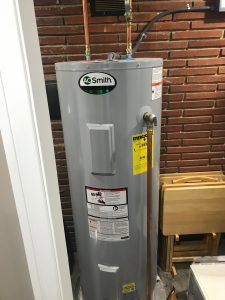Addressing Standard Water Heater Issues
Addressing Standard Water Heater Issues
Blog Article
We have come across this great article on Common Problems with Your Home Water Heater below on the internet and reckoned it made perfect sense to discuss it with you in this article.

Think of beginning your day without your routine warm shower. That already establishes a poor tone for the remainder of your day.
Every home requires a reliable hot water heater, but just a few know just how to manage one. One simple way to maintain your hot water heater in leading shape is to look for faults regularly and also fix them as soon as they appear.
Bear in mind to shut off your water heater prior to sniffing around for mistakes. These are the hot water heater faults you are most likely to run into.
Water also hot or also cold
Every hot water heater has a thermostat that identifies just how hot the water obtains. If the water entering into your home is too warm regardless of setting a convenient maximum temperature, your thermostat may be faulty.
On the other hand, also cold water may result from a failed thermostat, a broken circuit, or incorrect gas circulation. For example, if you utilize a gas water heater with a broken pilot light, you would obtain cold water, even if the thermostat remains in best problem. For electric heaters, a blown fuse may be the offender.
Not enough hot water
Water heaters come in numerous dimensions, relying on your hot water demands. If you lack hot water prior to everyone has had a bath, your hot water heater is too tiny for your family size. You must consider installing a larger hot water heater storage tank or selecting a tankless water heater, which takes up less space as well as is much more durable.
Unusual noises
There are at least 5 type of sounds you can speak with a hot water heater, however one of the most common interpretation is that it's time for the hot water heater to retire.
To start with, you should know with the normal sounds a water heater makes. An electric heater may sound different from a gas-powered one.
Popping or banging noises generally suggest there is a piece of sediment in your tanks, and also it's time to cleanse it out. On the other hand, whistling or hissing sounds might just be your valves allowing some pressure off.
Water leakages
Leaks can come from pipelines, water connections, shutoffs, or in the worst-case situation, the container itself. In time, water will certainly wear away the tank, and also find its way out. If this takes place, you need to change your hot water heater immediately.
Nonetheless, before your modification your entire tank, make sure that all pipelines remain in area and that each valve works completely. If you still require aid identifying a leak, call your plumber.
Rust-colored water
Rust-colored water implies among your water heater components is corroded. It could be the anode rod, or the storage tank itself. Your plumber will certainly have the ability to determine which it is.
Warm water
Regardless of exactly how high you set the thermostat, you will not obtain any type of hot water out of a heating unit well past its prime. A water heater's efficiency might lower with time.
You will certainly likewise get warm water if your pipelines have a cross connection. This implies that when you turn on a faucet, hot water from the heater moves in together with regular, cold water. A cross link is simple to place. If your warm water faucets still run after closing the water heater shutoffs, you have a cross connection.
Discoloured Water
Corrosion is a major reason for unclean or discoloured water. Corrosion within the water container or a failing anode pole can cause this discolouration. The anode pole safeguards the tank from rusting on the inside and also should be checked yearly. Without a rod or an appropriately operating anode pole, the hot water quickly wears away inside the storage tank. Get in touch with a specialist hot water heater technician to identify if replacing the anode pole will fix the issue; otherwise, replace your water heater.
Verdict
Ideally, your hot water heater can last one decade before you need a modification. Nonetheless, after the 10-year mark, you may experience any one of these faults extra on a regular basis. At this moment, you ought to include a brand-new water heater to your spending plan.
How To Troubleshoot 3 Common Water Heater Problems in Twin Cities
The Water Heater Is Leaking
A leaky cold water inlet valve A loose pipe fitting A leaky temperature and pressure relief valve A corroded anode rod A cracked tank Turn Off Your Water Heater:
Shut off your gas water heater by turning the gas valve on the unit to the “OFF” position. Shut off your electric water by switching its power off at your electrical panel. Look for a two-pole breaker labeled “water heater” and turn it to the “OFF” position. Move the ball valve connected to the water heater to be perpendicular to the piping at a 90° angle. Look for the Leak:
Depending on whether the water is coming from the tank's top or bottom, you’ll want to look for the leak in different locations.
If the leak comes from the top of the tank, carefully look for water escaping from the cold water inlet valve or loose pipe fittings. Rusted hot and cold water valves can have loose connections with the tank, with water leaking out of them.
https://mspplumbingheatingair.com/blog/how-to-troubleshoot-3-common-water-heater-problems
I was shown that article on Common Problems with Tank Water Heaters from an associate on a different website. Sharing is good. Helping people is fun. Thank you for your time. Don't forget to visit our website back soon.
We value timeliness. Report this page